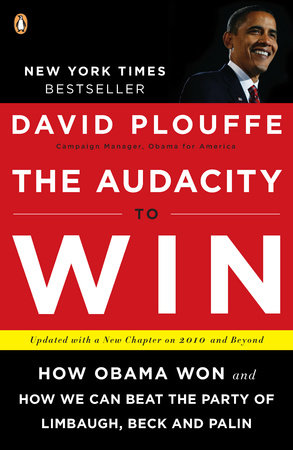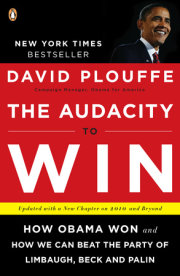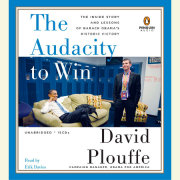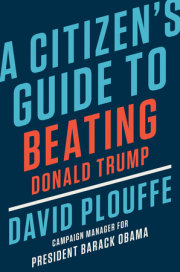1
Yes or No
The week before the 2006 congressional elections, my business partner, David Axelrod, and I were sitting in an editing suite in Chicago, putting the final touches on a series of television ads for various Democratic clients. We were seven or eight hours into a sixteen-hour session at the studio.
"I can't wait for this goddamned election to be over," I grumbled. "I want it to be over more than I want to win."
It was a biannual complaint. By October of each election year, everyone in the business has pulled too many all-nighters, been on too many conference calls, and read too many polls. If the whole profession could put the campaign in suspended animation and sleep for a week, it would.
Ax fiddled with some music selections for the spot we were working on. "Well, then you won't like this," he said. "Barack wants to meet in Chicago the day after the election to talk about the presidential race. And he wants you there. So don't get too excited for Election Day."
"Really?" I said. "Shit."
Obama's book tour that fall for The Audacity of Hope had unexpectedly turned into a presidential draft. Independent groups calling for him to run had sprung up across the country, generating tens of thousands of rabid potential supporters. There was clearly enthusiasm on the margins. It seemed to me to stem from a hunger for something new and a desire to turn the page not just on the Bush era, but on our own party's recent history.
The crowds and chatter around the book tour in turn bred a great deal of speculation in the political community and the media about a possible Obama candidacy. Obama would be appearing on Meet the Press one Sunday in October, and it was expected that host Tim Russert would press him on whether he was going to run. The question was complicated by the fact that Obama had been on the show in January 2006 and made a Shermanesque statement about not running in 2008.
The Saturday before his October Meet the Press appearance, Axelrod and I got on the phone with Obama and his press secretary, Robert Gibbs. Obama and Gibbs were driving down the New Jersey Turnpike toward Pennsylvania, in between rallies he was attending for Democratic U.S. Senate candidates. In 2006 Obama was the most in-demand speaker for Democratic candidates in every part of the country, thanks to the fame resulting from his stirring 2004 Democratic National Convention speech in Boston and the success of his two books.
Ax, Gibbs, and I were trying to find the right turn of phrase to reconcile what Obama had said in January with where he stood in October: while a presidential candidacy was, as he said to us privately, "unlikely," the response to the book tour, the state of the country, and his profound sense that we needed a big change in leadership had caused him to give the race some consideration.
We started by throwing out some of the standard nonanswers: "Tim, my focus now is helping Democrats win back the Congress in 2006," or "We haven't even had the 2006 election, so let's settle down a bit; there will be plenty of time to discuss 2008 down the line."
Obama listened and then offered a novel approach. "Why don't I just tell the truth?" he suggested. "Say I had no intention of even thinking about running when I was on the show in January but things have changed, and I will give it some thought after the 2006 elections."
That kind of straightforward answer may sound unremarkable, but politicians always twist themselves into knots denying the obvious on these shows. His instinct to drop the charade and just say what he was thinking was enormously refreshing.
When the strategy session ended I called Ax and said, "That was impressive. It sounds silly but I think if he answers the question that way people will be even more intrigued. Because it will sound so nonpolitical."
"That's what makes him unique," Ax replied. "He doesn't have that political gene so many of them do. He's still a human being."
Ax had known Obama since 1992, when Barack was running a voter registration drive in Chicago and Ax was emerging as the city's preeminent Democratic political consultant. They stayed in touch over the years, and even though Ax never worked for him in a political capacity, they built a strong friendship. He often said Obama was one of the smartest people he had ever known—maybe the smartest.
Ax and I were partners in a political consulting firm. We met in 1994 when I was managing a U.S. Senate race in Delaware and he was hired to serve as our media consultant. His firm produced our television and radio ads and served as campaign advisers on strategy and message.
I thought David was unique among political consultants. He was not slick—in fact, whatever the opposite of slick is, Ax was its poster child. He and his partners did not take on too many races, choosing instead to pour themselves into a handful of worthy efforts. Ax took great pride in his work, opting for quality over quantity, and he had a healthy disregard for Washington, which I found appealing. He also had a great sense of humor, was a legendarily poor dresser, and was profoundly disorganized. And he was one of the smartest people I had ever met.
We lost the Delaware race—as did just about every Democrat facing the Republican tsunami of 1994—but I thought Ax did an excellent job for us, and we stayed in touch. In 2001 he asked me if I'd be interested in joining his firm as a partner. The idea appealed to me; I was interested in learning a new discipline—advertisement production—and respected the firm's focused approach. I agreed to join but would work out of Washington instead of theChicago headquarters.
The firm—which became AKP Media in 2007—had a meeting in late 2002 to discuss business options for 2003 and 2004. The main topic of conversation was the 2004 Illinois senate race, which would be an open seat.
The two main Democratic contenders were Blair Hull, a very wealthy businessman who had vowed to spend millions on his campaign, and Dan Hynes, the state controller, who would have the endorsement of the state party and many labor unions and was considered a strong favorite. Both candidates had approached us about working for them, and David had sat down with each man to size him up.
But at our meeting he announced that he did not want to work for either. Instead, he thought we should work for a little-known state senator named Barack Hussein Obama, who was given zero chance to win by the political establishment. Just fourteen months after September 11, most believed his name alone would sink his candidacy.
"One of the others will probably win," Ax told us. "But Barack Obama is the kind of guy who should be in the U.S. Senate. He's bright, principled, skilled legislatively, and committed to a politics that lifts people up. I think that's who we should work for."
"Let me get this straight," summed up one of our colleagues. "We should work for the candidate with no chance, no money, and the funny name?"
"As I keep telling you guys," Ax wryly replied, "I am a terrible businessman."
So that was that. Ax had been the lead political reporter for the Chicago Tribune before transitioning into politics and had since elected mayors, senators, and congressmen throughout the state. He was considered the godfather of Illinois Democratic politics, from the operative side of the fence, and had great latitude on any decision the firm made involving Illinois.
I was not heavily involved in the day-to-day of Obama's 2004 Senate race, having other projects that I was primarily responsible for, but I attended some meetings and wrote his initial campaign plans for the primary election and then, when he won the primary in a stunning landslide, for the general.
My first meeting with him came at Ax's request in the spring of 2003. I flew into Chicago from D.C., and the three of us had breakfast at my hotel on Michigan Avenue. My mission at the breakfast was simple: convince Barack that he could not run for U.S. Senate and simultaneously serve as both his own driver and scheduler. The fledgling campaign was struggling with this as well as a host of other remedial issues: he was not spending enough time making fundraising calls. He was not closing the deal effectively enough with potential political supporters. And he was generally having a hard time allowing his campaign staff to take more responsibility for both the campaign and his life.
"You just have to let go and trust," I told him. "Your staff will inevitably screw up. But the most precious resource in any campaign is time. The candidate's time. Your time. You have to be the candidate. Not the campaign manager, scheduler, or driver."
"I understand that intellectually," he said, "but this is my life and career. And I think I could probably do every job on the campaign better than the people I'll hire to do it. It's hard to give up control when that's all I've known in my political life. But I hear you and will try to do better."
It was my first exposure to Obama's significant self-confidence. We chatted about the race for the rest of breakfast. I was struck by his intelligence and ease, and noticed that he lit up more when talking about policy than politics. I also noted his thoughts on campaign strategy—he was determined to win not with thirty-second ads and clever sound bites, but by building a grassroots campaign throughout Illinois. With rare exceptions, that was not the way politics was done anymore. Maybe Ax is on to something here, I thought. This is the kind of person we need in politics—and that we desperately need in Washington.
Still, had I been asked to gauge the likelihood that three and a half years later we'd be discussing whether Barack Obama should run for president, I wouldn't have taken the question seriously. At that time, with the country still shaken from 9/11, and the Republicans entrenched in power, it would have seemed insane.
But by 2006 the suggestion had gained a hint of plausibility. The political playing field had shifted dramatically, and one of the reasons was the mood and state of the country. President George Bush was deeply unpopular. Iraq, the economy, divisiveness in Washington, and the erosion of our moral leadership around the world had sent both Bush's and the Republican Party's stock plummeting.
As a result, Democrats scored a resounding victory in the 2006 congressional election, winning the House for the first time in twelve years and winning enough Senate races, coupled with the defection of a moderate Republican senator, to control that chamber for only the second time in twelve years. It was an electoral bloodbath for the GOP.
Historically, the sixth year of a two-term presidency can result in big losses for the incumbent's party. In 2006 something deeper was at work, and it was related to the feeling that the core leadership had turned rotten. Voters believed the Democrats' argument that Republican majorities were engaged in a culture of corruption, with lobbyists like the felonious Jack Abramoff calling the shots, showering their political patrons with money, and getting the desired results for themselves and their clients. Meanwhile, the people were getting hosed. Voters wanted a clean break.
The 2006 election swept many Republicans from office, but it did not quench that appetite for fundamental change. Voters wanted more and the presidential race was their chance to complete the job. Without this hunger for change, driven by a belief that Washington was fundamentally broken, the idea of a Barack Obama candidacy could not have taken flight.
Against this backdrop the nascent Obama organization had its first meeting to discuss the presidential race. Ax and I had spent election night of 2006 at the Democratic Congressional Campaign Committee (DCCC), the committee in charge of U.S. House races for the Democrats. We had poured our hearts into the effort for the past two years, partly because it felt personal. Rahm Emanuel, one of Ax's oldest friends, was the DCCC's chairman, and I had run the DCCC in 2000, coming a few thousand votes short in a razor-close national battle for the House. Six years later the job was finally done. We were ecstatic.
It was the kind of night that deserved a few days to soak in. Instead, after a few hours of sleep, we boarded a flight for Chicago to discuss the slimmest possibility, an Obama for President campaign.
My sense was that we would go through the process over the next couple of months and he would decide not to run. Almost every major presidential candidate in recent memory had been doing rigorous planning and laying groundwork for years before jumping in. Even long-shot candidates who eventually don't run still do the legwork. Most of the major Democratic contenders in 2008 spent the previous two years—and sometimes longer—on the hustings in Iowa and New Hampshire, building relationships, acquiring quiet offers of support, and familiarizing themselves with these sometimes-quirky states. Biden, Warner, Dodd, Edwards, and Bayh—all had been relentlessly planning and precampaigning. Hillary Clinton was in rarefied air all her own; armed with assets built up over twenty years, she was content to allow lesser candidates to bounce around Iowa. She would take things by storm at the moment of her choosing, when her army would gather and take the field.
I approached this meeting skeptical that a campaign would materialize, doubtful one should, and a little cranky that less than twelve hours after one election had ended the next one was beginning. Unless Obama decided that afternoon not to run, the time that I had planned to spend with my family would instead be spent writing memos and doing analysis that would likely lead nowhere.
Our initial meeting was small and consisted of Barack and Michelle Obama; their close Chicago friends Valerie Jarrett and Marty Nesbitt; Obama's Senate chief of staff Pete Rouse; his spokesman, Robert Gibbs; his scheduler and political hand, Alyssa Mastromonaco; Steve Hildebrand, a Democratic operative; and Axelrod and me.
We were a motley crew. Gibbs had left John Kerry's presidential campaign in 2003 during a purge and had entered a form of political purgatory. When Obama won the primary for the Senate race in 2004, we set out to enhance his campaign with more seasoned hands and brought Gibbs on board. He was from Alabama, a die-hard Auburn fan who had served as the top communications staffer in a number of campaigns and Democratic organizations. He was known as a tough enforcer who skipped the velvet on his hammer. Signing up with Obama helped rehabilitate his promising career. Despite their different demeanors and upbringings, over the course of the Senate campaign and then two years in the Senate, Gibbs and Obama grew quite close. Obama leaned on him for his political and media judgment, and would clearly want him to play a major role if he decided to run.
From his first days in the Senate, Obama drew top talent. Rouse had been the chief of staff for Tom Daschle when he was the Democratic leader, and Rouse had gained such respect and clout that he became known as the 101st Senator. When Daschle lost his reelection race in 2004, Obama courted Rouse hard to be his own chief of staff. Pete originally demurred but eventually gave in, providing the invaluable assistance of a skilled guide as Obama made his way in the Senate. Alyssa had been the scheduler for John Kerry's presidential campaign; doing a similar job, albeit with additional political responsibilities, for a freshman senator would normally be seen as a backward career move but she was drawn to Obama's potential.
Steve Hildebrand had been running Democratic campaigns for years and was one of the most respected managers and organizers in the party. He knew Iowa well, having run Al Gore's caucus campaign there in 2000. He originally got involved when he accompanied Obama to the Harkin Steak Fry in Iowa in October at Rouse's invitation, where the excited reaction to Obama added to the intensity of the speculation about his plans; after a few outings with Barack, Hildebrand had become a true believer, and relentlessly pressed him to make a presidential bid.
Valerie and Marty were both close personal friends of the Obamas and had been around Illinois politics for some time. Valerie had served as the finance chair for the 2004 Obama Senate race. I got the sense that after the meeting was over, Valerie, Marty, Barack, and Michelle would have a separate discussion to evaluate how it went. They would be important sounding boards throughout the campaign.
We met in a small room at AKP Media. Crowded around a conference table, we all waited to hear for the first time exactly what Obama was thinking. Within minutes it was clear he had given this a lot more thought than most of us had realized. He laid out why he was considering a run: the country needed deep, fundamental change; Washington wasn't thinking long term; and we had big challenges like energy and health care that had languished for decades; the special interests and lobbyists had too much power, and the American people needed to once again trust and engage in their democracy; the country was too divided; and the middle class and those trying to get into the middle class, especially their children, ran the risk of having less opportunity than generations before. His question for us—before we got to any of the politics—was whether he offered something distinct enough from the other candidates in terms of addressing these challenges that it merited a campaign. I thought his answers a pretty strong rationale for a candidacy and a strong campaign message. We had done some baseline research on where the race stood, but no message testing, and we hadn't taken any polls to derive that message, which was exhilarating in itself. I was also struck that his initial assessment of the race was all about substance, not about politics. I have been in very few meetings with candidates or potential candidates where this was this case.
Barack did ask questions about the politics, and to a person we all said that Hillary Clinton was an enormously strong front-runner. In fact, at this point, it was tough to see how she could lose. We spent some time on the other candidates, but only briefly, discussing John Edwards's strength in the first contest, Iowa, and how that was a complicating factor; because we could not assume the role of alternative to Clinton there, we'd have to earn it. She was the eight-hundred-pound gorilla, with organizations in every state, 100 percent name recognition, and a fund-raising machine ready to be switched on at a moment's notice. We had none of this. Nothing, nada, zilch. Any political conversation about the 2008 primaries started and ended with Hillary Clinton.
Michelle Obama had questions about what this would mean to their family. How often would Barack be campaigning out of town? Could they still have many weekends together? Would the family be able to campaign together? How much would she need to do and how would that work with her job and looking after their daughters?
This was the first time I had met Michelle and I was impressed by her directness and the no-nonsense focus of her questioning. She clearly wanted all the facts, and I could tell that running was not going to be solely Barack's decision—they would decide together.
Other than Hildebrand, who was the cheerleader in the room and offered a dubious fairy tale about not campaigning on Sundays and a lot of time at home, no one had good news for Michelle. There could be no shortcuts. It would be grueling and then more grueling. The candidate would only be home for snatches of time and when he was, there would be calls to make and speeches to review. And it would last at least a year if we lost. Two if we won.
I felt satisfied that there was no window dressing. They needed to make their decision with open eyes and all the facts. But hearing is different than living; we couldn't control how they received the message. I knew they could rationalize that the obstacle course was manageable, only to find themselves stuck midcourse.
The consensus concerning Michelle's involvement was that the campaign, if it existed, would want to use her as much as possible, but that she would tell us when she could travel, and we would utilize that time, with no pressure on her to do more. The Obamas made clear they would not outsource the care of their two young girls, so we would work around the family schedule, not the other way around.
At the end of the meeting we agreed we would reconvene in a couple of weeks and each of us would produce something to move the discussion forward—a sample schedule so the Obamas could see what their lives might look like day to day and month to month; an initial overview of the calendar and our provisional electoral strategy recommendations; fund-raising estimates; and an overview of what the first three months' imperatives and benchmarks would be.
Obama said he would spend time with Michelle discussing whether they could make this work as a family. He made it clear that the campaign's message—the rationale he had laid out at the meeting's outset—was not negotiable. So the Obamas would report on their ruminations about the family and lifestyle issues, and the rest of us would spend the bulk of our time discussing, in his words, "whether we can build not a winning campaign, but a credible one." That was our bar. It may seem low. But given our starting point, it was alpine.
I still believed the undertaking was largely a theoretical exercise, but Obama was more serious about running than I had anticipated. I called Ax on my way to O'Hare to get his take. "I think he wants to run, but he's drawn more to the idea of running than actually running," he said. "We'll see how he processes the reality of what this will mean, how hard it is, and how long the odds are. Michelle is the wild card. If she is opposed, there is no way this is going to happen. And I can't read yet where she'll come down."
I sighed. "Well, all I know is I was supposed to be at Disneyland with my son next week but we'll have to postpone that to pull together everything he asked for. But I was impressed by him. He clearly has a good sense of why he might want to run, and it's not about power or politics or some long-held ambition. I still think he doesn't do it—how many people have just sort of, last minute, with no planning, rolled the dice and jumped into a presidential race against maybe the strongest front-runner in history? With young kids to boot?"
"It's likely all our work will be for naught," Ax agreed. "But we owe this a real solid effort so at least he has everything he needs to make the decision."
In the interim before our next meeting, Obama organized a gathering with some of his key Senate staff, friends, and outside advisers in Washington. It was like a Harvard Law School reunion. Axelrod and I attended, and we listened as Obama explained his current thinking and asked everyone in the room to offer their thoughts, opinions, and concerns.
I was impressed by the thoughtfulness of the responses. Most centered on concern about what this would mean to his family; some flatly said they thought it was too early; others said he should run before he spent too much time in Washington and got senatoritis. Others thought it would be difficult to put together a campaign in such a short amount of time. I found it noteworthy that Obama surrounded himself with a fairly selfless crew, all the more remarkable given the type A ambitions often associated with a roomful of Harvard Law grads. I didn't get the sense that any of them were offering their opinions based on what was in it for them—the chance to be close to a new and exciting presidential candidate.
Toward the end of the meeting, Obama turned to me and asked me to outline what would be required to get a presidential campaign up and running and how it might operate. I spent about fifteen minutes ticking through the immediate imperatives were he to commit: launch a cutting-edge website, recruit talented senior staff, develop a plan and budget. I also talked about how strong Clinton was, and our need to focus on the early primary states in order to reset the race—when front-runners stumble early, they have generally been visited with great peril, though they almost always win anyway. We had not discussed electoral strategy in depth, but I thought it was important for his friends to understand from the get-go this would not be a sexy pursuit filled with grand white papers and big crowds in major metropolitan areas; we'd likely have to grind it out one voter at a time in Iowa to have any chance of winning. I made the point that to beat Hillary we'd have to run a perfect campaign. And even if we came close to doing that, the odds were still heavily in her favor.
The room was quiet during my spiel and I got the sense the theoretical had become more real—for Obama, too. It also dawned on me that if he ran, he might ask me to manage his campaign. Instantly, I thought I should have kept my mouth shut.
For the past five years I had been a consultant, with Axelrod as my partner. I got paid to give advice, not to be responsible for every facet of a sprawling organization. Before getting into consulting, I had managed two U.S. Senate races, a congressional race, and a national party committee. I knew exactly what managing was—a pain in the ass.
There is a heady side to it, sure, but the job encompasses a lot more than just developing electoral theories, obsessing about metrics, and spending lots of money creatively. It also requires dealing with myriad personnel issues, mediating internal disputes, and worrying about things like office air-conditioning costs and how much to reimburse staff for mileage—stuff I had not had to worry about for a long time but remembered as a grind. The manager has to be on top of every aspect of the campaign—when the candidate calls, he or she can't say, "I haven't been paying much attention to (fill in the blank). Let me talk to the staffer who has." As I had told Obama, there are no shortcuts. The manager's ass is on the line every minute of every day. The campaign has to be all-consuming.
I had not managed since 2000 and aside from knowing I would be rusty, I was not sure my family or I could handle it. I grew very uneasy at the prospect the more I thought about it. My wife and I had a two-year-old son, we had just moved into a new house, and we had family plans for 2007. My wife had a successful career and was applying to graduate school for the fall. We were also hoping to add another baby to the mix. A campaign would upset the whole apple cart.
Standing on the street outside the gathering, I said to Ax, "I see where this is headed. I am the logical choice of the folks around him to manage this. Well, I don't want to and I'm not even sure I'm a good choice. We better come up with some other options. Fast."
"You go right ahead," Ax said, smiling sweetly. "But I am going to tell him you are the only and best choice. We'll be in this boat together, even if it goes down."
Copyright © 2009 by David Plouffe. All rights reserved. No part of this excerpt may be reproduced or reprinted without permission in writing from the publisher.









